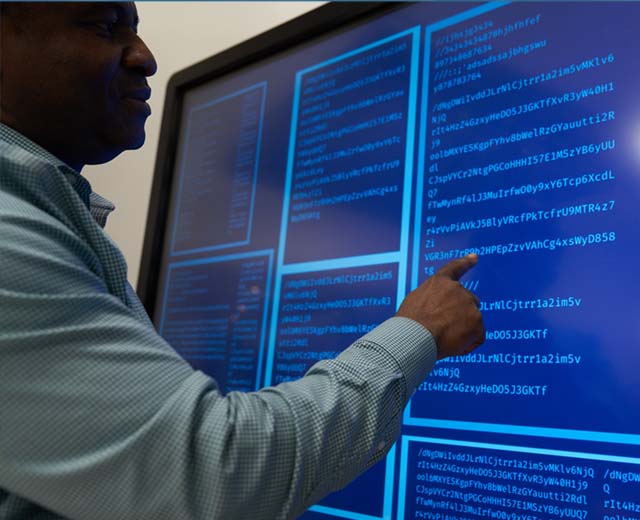
Prepare to become a leader in the protection of data with an online bachelor’s degree in cybersecurity management and policy from UMGC. This innovative program uses a multidisciplinary approach, drawing from fields such as management, law, science, business, technology, and psychology. Designed with input from employers, industry experts, and scholars, the curriculum combines theories with real-world applications to provide you with skills for protecting critical cyber infrastructure.
Review the options available to fulfill the 41 credits of general education coursework for bachelor's degrees.
Review a list of available academic minors or see the course catalog or Schedule of Classes to help you select elective courses.
This is our recommended course sequence to progress through this program. You may take multiple courses simultaneously, up to your course load limit. You cannot take a prerequisite with its subsequent course during the same session. Your plan will be unique and dependent on multiple factors, including the number of credits you transfer to this program. Contact an advisor if you have any questions about this plan, course alternatives, or your course load limit.
| Sequence | Course | Requirement(s) Fulfilled |
| 1 | Program and Career Exploration in Technology (3 Credits, PACE 111T) | General Education: Research & Computing Literacy |
| 2 | Introduction to Research (1 Credit, LIBS 150) | General Education: Research & Computing Literacy |
| 3 | Academic Writing I (3 Credits, WRTG 111) | General Education: Communication |
| 4 | Concepts and Applications of Information Technology (3 Credits, IFSM 201) | General Education: Research & Computing Literacy; Prerequisite to Major |
| 5 | Elements of Nutrition (3 Credits, NUTR 100) | General Education: Biological & Physical Sciences |
| 6 | Cybersecurity for Leaders and Managers (3 Credits, CSIA 300) | Major |
| 7 | Foundations of Oral Communication (3 Credits, SPCH 100) | General Education: Communication |
| 8 | College Algebra (3 Credits, MATH 107) | General Education: Math |
| 9 | Academic Writing II (3 Credits, WRTG 112) | General Education: Communication |
| 10 | Ethics in Information Technology (3 Credits, IFSM 304) | Major |
| 11 | Technological Transformations (3 Credits, HIST 125) | General Education: Arts & Humanities |
| 12 | Introduction to Biology (4 Credits, BIOL 103) | General Education: Biological & Physical Sciences |
| 13 | Technology in Contemporary Society (3 Credits, BEHS 103) | General Education: Behavioral & Social Sciences |
| 14 | Understanding Movies (3 Credits, ARTH 334) | General Education: Arts & Humanities |
| 15 | Fundamentals of Computer Troubleshooting (3 Credits, CMIT 202) | Elective; Prerequisite to Major Requirement |
| 16 | Economics in the Information Age (3 Credits, ECON 103) | General Education: Behavioral & Social Sciences |
| 17 | Fundamentals of Networking (3 Credits, CMIT 265) | Major |
| 18 | 3-credit elective course | Elective |
| 19 | Network Security (3 Credits, CMIT 320) | Major |
| 20 | 3-credit elective course | Elective |
| 21 | Cybersecurity Processes and Technologies (3 Credits, CSIA 310) | Major |
| 22 | 3-credit elective course | Elective |
| 23 | Cybersecurity in Business and Industry (3 Credits, CSIA 350) | Major |
| 24 | Advanced Technical Writing (3 Credits, WRTG 393) | General Education: Communication |
| 25 | 3-credit elective course | Elective |
| 26 | Cybersecurity in Government Organizations (3 Credits, CSIA 360) | Major |
| 27 | 3-credit elective course | Elective |
| 28 | 3-credit elective course | Elective |
| 29 | Cybersecurity Policy, Plans, and Programs (3 Credits, CSIA 413) | Major |
| 30 | 3-credit elective course | Elective |
| 31 | 3-credit elective course | Elective |
| 32 | Evaluating Emerging Technologies (3 Credits, CSIA 459) | Major |
| 33 | 3-credit elective course | Elective |
| 34 | 3-credit elective course | Elective |
| 35 | Advanced Information Systems Security (3 Credits, CMIT 425) | Major |
| 36 | 3-credit elective course | Elective |
| 37 | 3-credit elective course | Elective |
| 38 | 3-credit elective course | Elective |
| 39 | 3-credit elective course | Elective |
| 40 | Cyber Management and Policy Capstone (3 Credits, CSIA 485) | Major |
| 41 | Career Planning Management (1 Credit, CAPL 398A) | Elective |
Review the options available to fulfill the 41 credits of general education coursework for bachelor's degrees.
Review a list of available academic minors or see the course catalog or Schedule of Classes to help you select elective courses.
This is our recommended course sequence to progress through this program. You may take multiple courses simultaneously, up to your course load limit. You cannot take a prerequisite with its subsequent course during the same session. Your plan will be unique and dependent on multiple factors, including the number of credits you transfer to this program. Contact an advisor if you have any questions about this plan, course alternatives, or your course load limit.
| Sequence | Course | Requirement(s) Fulfilled |
| 1 | Program and Career Exploration in Technology (3 Credits, PACE 111T) | General Education: Research & Computing Literacy |
| 2 | Introduction to Research (1 Credit, LIBS 150) | General Education: Research & Computing Literacy |
| 3 | Academic Writing I (3 Credits, WRTG 111) | General Education: Communication |
| 4 | Concepts and Applications of Information Technology (3 Credits, IFSM 201) | General Education: Research & Computing Literacy; Prerequisite to Major |
| 5 | Elements of Nutrition (3 Credits, NUTR 100) | General Education: Biological & Physical Sciences |
| 6 | Cybersecurity for Leaders and Managers (3 Credits, CSIA 300) | Major |
| 7 | Foundations of Oral Communication (3 Credits, SPCH 100) | General Education: Communication |
| 8 | College Algebra (3 Credits, MATH 107) | General Education: Math |
| 9 | Academic Writing II (3 Credits, WRTG 112) | General Education: Communication |
| 10 | Ethics in Information Technology (3 Credits, IFSM 304) | Major |
| 11 | Technological Transformations (3 Credits, HIST 125) | General Education: Arts & Humanities |
| 12 | Introduction to Biology (4 Credits, BIOL 103) | General Education: Biological & Physical Sciences |
| 13 | Technology in Contemporary Society (3 Credits, BEHS 103) | General Education: Behavioral & Social Sciences |
| 14 | Understanding Movies (3 Credits, ARTH 334) | General Education: Arts & Humanities |
| 15 | Fundamentals of Computer Troubleshooting (3 Credits, CMIT 202) | Elective; Prerequisite to Major Requirement |
| 16 | Economics in the Information Age (3 Credits, ECON 103) | General Education: Behavioral & Social Sciences |
| 17 | Fundamentals of Networking (3 Credits, CMIT 265) | Major |
| 18 | 3-credit elective course | Elective |
| 19 | Network Security (3 Credits, CMIT 320) | Major |
| 20 | 3-credit elective course | Elective |
| 21 | Cybersecurity Processes and Technologies (3 Credits, CSIA 310) | Major |
| 22 | 3-credit elective course | Elective |
| 23 | Cybersecurity in Business and Industry (3 Credits, CSIA 350) | Major |
| 24 | Advanced Technical Writing (3 Credits, WRTG 393) | General Education: Communication |
| 25 | 3-credit elective course | Elective |
| 26 | Cybersecurity in Government Organizations (3 Credits, CSIA 360) | Major |
| 27 | 3-credit elective course | Elective |
| 28 | 3-credit elective course | Elective |
| 29 | Cybersecurity Policy, Plans, and Programs (3 Credits, CSIA 413) | Major |
| 30 | 3-credit elective course | Elective |
| 31 | 3-credit elective course | Elective |
| 32 | Evaluating Emerging Technologies (3 Credits, CSIA 459) | Major |
| 33 | 3-credit elective course | Elective |
| 34 | 3-credit elective course | Elective |
| 35 | Advanced Information Systems Security (3 Credits, CMIT 425) | Major |
| 36 | 3-credit elective course | Elective |
| 37 | 3-credit elective course | Elective |
| 38 | 3-credit elective course | Elective |
| 39 | 3-credit elective course | Elective |
| 40 | Cyber Management and Policy Capstone (3 Credits, CSIA 485) | Major |
| 41 | Career Planning Management (1 Credit, CAPL 398A) | Elective |
These requirements are for students who enroll in the 2024–2025 academic year. For prior year requirements, visit our catalog archive.
In addition to the specific course requirements outlined on each bachelor’s degree webpage, UMGC maintains certain requirements for all bachelor’s degrees.
Develop skills and gain knowledge through coursework that draws from the expertise and experience of our respected faculty.
Integrate Best PracticesIntegrate cybersecurity best practices and guidance to formulate protection strategies for an organization’s critical information and assets.
Improve Cyber GovernanceEvaluate the applicability of laws, regulations, standards, and frameworks to improve organizational resilience and governance of cybersecurity capabilities.
Mitigate RiskApply business analysis principles to identify, assess, and mitigate organizational risk, including acquisition and supply chain risk, arising from diverse sources.
Apply FrameworksApply risk management frameworks to identify cybersecurity needs and integrate best practices to improve cybersecurity positions for municipal, state, federal, and international government agencies and organizations.
Integrate SolutionsIntegrate continuous monitoring and real-time security solutions to improve situational awareness and deployment of countermeasures within an organization.
Evaluate TechnologyEvaluate technology applications to support the cybersecurity goals and objectives of an organization.
Respond to Incidents Participate in the incident response and recovery process for an organization. Communicate EffectivelyApply the principles of professional communications and technical writing to effectively communicate about cybersecurity in organizational settings.
This program is designed to help you develop skills to manage the people and technologies required to protect information, information systems, and infrastructures including the nation's critical cyber infrastructures. It is ideal for students who want to leverage previous work experience to move into a leadership or management role within a corporate organization or government agency.
Faustina A. (left), Lancaster, PA & Diana M. (right), Elkridge, MDCompare All Programs
Current Program Cybersecurity Management and Policy Bachelor of Science Cybersecurity Technology Bachelor of Science Computer Networking Undergraduate CertificateCompare All Programs
This program is designed to help prepare you for the following certification exams:
The Cyber Competition Team represents UMGC at various cybersecurity events and tournaments nationwide. Being a member of the team gives students an opportunity to develop their cybersecurity skills and network with other students. The team is open to undergraduate and graduate students and alumni through a tryout process. Email jesse.varsalone@umgc.edu or visit the team webpage to learn more.
For some of the upper-level cybersecurity and IT courses in this program, you will need equipment that meets the following specifications. Courses in graphics- or computing-intensive disciplines may require a higher processing speed, more RAM, and/or better screen resolution.
Choose one of the following:
The Cyber Competition Team represents UMGC at various cybersecurity events and tournaments nationwide. Being a member of the team gives students an opportunity to develop their cybersecurity skills and network with other students. The team is open to undergraduate and graduate students and alumni through a tryout process. Email jesse.varsalone@umgc.edu or visit the team webpage to learn more.
Technology RequirementsFor some of the upper-level cybersecurity and IT courses in this program, you will need equipment that meets the following specifications. Courses in graphics- or computing-intensive disciplines may require a higher processing speed, more RAM, and/or better screen resolution.
Choose one of the following:

UMGC launches the Multi-Dimensional Applied Relevant System (MARS) virtual learning environment.

Learn more about how Starlink’s involvement in Ukraine affects technology on a global scale.

Read tips on how to choose a cybersecurity degree program.
An online bachelor’s degree in cybersecurity management & policy is a college degree students can earn online that can help them prepare to become leaders in the protection of data. UMGC’s innovative 120-credit program uses a multidisciplinary approach, drawing from fields such as management, law, science, business, technology, and psychology. Designed with input from employers, industry experts, and scholars, the curriculum combines theories with real-world applications to provide you with skills for protecting critical cyber infrastructure in both the private and public sectors.